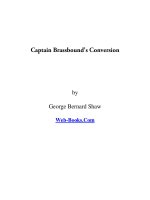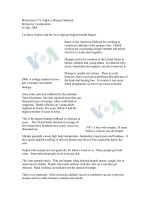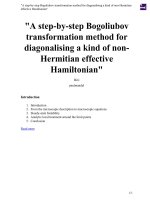Captain Brassbound's Conversion
Bạn đang xem bản rút gọn của tài liệu. Xem và tải ngay bản đầy đủ của tài liệu tại đây (75.64 KB, 11 trang )
Captain Brassbound's Conversion
by
George Bernard Shaw
Web-Books.Com
Captain Brassbound's Conversion
ACT I.................................................................................................................................. 3
ACT II.............................................................................................................................. 27
ACT III ............................................................................................................................ 59
Notes To Captain Brassbound's Conversion................................................................ 87
SOURCES OF THE PLAY .......................................................................................... 87
ENGLISH AND AMERICAN DIALECTS................................................................. 89
ACT I
On the heights overlooking the harbor of Mogador, a seaport on the west coast of
Morocco, the missionary, in the coolness of the late afternoon, is following the
precept of Voltaire by cultivating his garden. He is an elderly Scotchman,
spiritually a little weatherbeaten, as having to navigate his creed in strange
waters crowded with other craft but still a convinced son of the Free Church and
the North African Mission, with a faithful brown eye, and a peaceful soul.
Physically a wiry small-knit man, well tanned, clean shaven, with delicate
resolute features and a twinkle of mild humor. He wears the sun helmet and
pagri, the neutral-tinted spectacles, and the white canvas Spanish sand shoes of
the modern Scotch missionary: but instead of a cheap tourist's suit from
Glasgow, a grey flannel shirt with white collar, a green sailor knot tie with a cheap
pin in it, he wears a suit of clean white linen, acceptable in color, if not in cut, to
the Moorish mind.
The view from the garden includes much Atlantic Ocean and a long stretch of
sandy coast to the south, swept by the north east trade wind, and scantily
nourishing a few stunted pepper trees, mangy palms, and tamarisks. The
prospect ends, as far as the land is concerned, in little hills that come nearly to
the sea: rudiments, these, of the Atlas Mountains. The missionary, having had
daily opportunities of looking at this seascape for thirty years or so, pays no heed
to it, being absorbed in trimming a huge red geranium bush, to English eyes
unnaturally big, which, with a dusty smilax or two, is the sole product of his pet
flower-bed. He is sitting to his work on a Moorish stool. In the middle of the
garden there is a pleasant seat in the shade of a tamarisk tree. The house is in
the south west corner of the garden, and the geranium bush in the north east
corner.
At the garden-door of the house there appears presently a man who is clearly no
barbarian, being in fact a less agreeable product peculiar to modern commercial
civilization. His frame and flesh are those of an ill-nourished lad of seventeen; but
his age is inscrutable: only the absence of any sign of grey in his mud colored
hair suggests that he is at all events probably under forty, without prejudice to the
possibility of his being under twenty. A Londoner would recognize him at once as
an extreme but hardy specimen of the abortion produced by nature in a city slum.
His utterance, affectedly pumped and hearty, and naturally vulgar and nasal, is
ready and fluent: nature, a Board School education, and some kerbstone practice
having made him a bit of an orator. His dialect, apart from its base nasal delivery,
is not unlike that of smart London society in its tendency to replace diphthongs by
vowels (sometimes rather prettily) and to shuffle all the traditional vowel
pronunciations. He pronounces ow as ah, and i as aw, using the ordinary ow for
o, i for a, a for u, and e for a, with this reservation, that when any vowel is
followed by an r he signifies its presence, not by pronouncing the r, which he
never does under these circumstances, but by prolonging and modifyinq the
vowel, sometimes even to the extreme degree of pronouncing it properly. As to
his yol for l (a compendious delivery of the provincial eh-al), and other
metropolitan refinements, amazing to all but cockneys, they cannot be indicated,
save in the above imperfect manner, without the aid of a phonetic alphabet. He is
dressed in somebody else's very second best as a coast-guardsman, and gives
himself the airs of a stage tar with sufficient success to pass as a possible fish
porter of bad character in casual employment during busy times at Billingsgate.
His manner shows an earnest disposition to ingratiate himself with the
missionary, probably for some dishonest purpose.
THE MAN. Awtenoon, Mr. Renkin. (The missionary sits up quickly, and turns,
resigning himself dutifully to the interruption.) Yr honor's eolth.
RANKIN (reservedly). Good afternoon, Mr. Drinkwotter.
DRINKWATER. You're not best pleased to be hinterrupted in yr bit o gawdnin
bow the lawk o me, gavner.
RANKIN. A missionary knows nothing of leks of that soart, or of disleks either,
Mr. Drinkwotter. What can I do for ye?
DRINKWATER (heartily). Nathink, gavner. Awve brort noos fer yer.
RANKIN. Well, sit ye doon.
DRINKWATER. Aw thenk yr honor. (He sits down on the seat under the tree and
composes himself for conversation.) Hever ear o Jadge Ellam?
RANKIN. Sir Howrrd Hallam?
DRINKWATER. Thet's im-enginest jadge in Hingland! --awlus gives the ket wen
it's robbry with voylence, bless is awt. Aw sy nathink agin im: awm all fer lor
mawseolf, AW em.
RANKIN. Well?
DRINKWATER. Hever ear of is sist-in-lor: Lidy Sisly Winefleet?
RANKIN. Do ye mean the celebrated Leddy--the traveller?
DRINKWATER. Yuss: should think aw doo. Walked acrost Harfricar with nathink
but a little dawg, and wrowt abaht it in the Dily Mile (the Daily Mail, a popular
London newspaper), she did.
RANKIN. Is she Sir Howrrd Hallam's sister-in-law?
DRINKWATER. Deeceased wawfe's sister: yuss: thet's wot SHE is.
RANKIN. Well, what about them?
DRINKWATER. Wot abaht them! Waw, they're EAH. Lannid aht of a steam yacht
in Mogador awber not twenty minnits agow. Gorn to the British cornsl's. E'll send
em orn to you: e ynt got naowheres to put em. Sor em awr (hire) a Harab an two
Krooboys to kerry their laggige. Thort awd cam an teoll yer.
RANKIN. Thank you. It's verra kind of you, Mr. Drinkwotter.
DRINKWATER. Down't mention it, gavner. Lor bless yer, wawn't it you as
converted me? Wot was aw wen aw cam eah but a pore lorst sinner? Down't aw
ow y'a turn fer thet? Besawds, gavner, this Lidy Sisly Winefleet mawt wor't to tike
a walk crost Morocker--a rawd inter the mahntns or sech lawk. Weoll, as you
knaow, gavner, thet cawn't be done eah withaht a hescort.
RANKIN. It's impoassible: th' would oall b' murrdered. Morocco is not lek the rest
of Africa.
DRINKWATER. No, gavner: these eah Moors ez their religion; an it mikes em
dinegerous. Hever convert a Moor, gavner?
RANKIN (with a rueful smile). No.
DRINKWATER (solemnly). Nor never will, gavner.
RANKIN. I have been at work here for twenty-five years, Mr. Drinkwotter; and
you are my first and only convert.
DRINKWATER. Down't seem naow good, do it, gavner?
RANKIN. I don't say that. I hope I have done some good. They come to me for
medicine when they are ill; and they call me the Christian who is not a thief.
THAT is something.
DRINKWATER. Their mawnds kennot rawse to Christiennity lawk hahrs ken,
gavner: thet's ah it is. Weoll, ez haw was syin, if a hescort is wornted, there's
maw friend and commawnder Kepn Brarsbahnd of the schooner Thenksgivin, an









